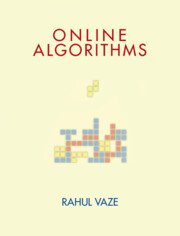Book contents
- Frontmatter
- Dedication
- Contents
- Preface
- Acknowledgements
- Notation
- 1 Introduction
- 2 Ski-Rental
- 3 List Accessing
- 4 Bin-Packing
- 5 Paging
- 6 Metrical Task System
- 7 Secretary Problem
- 8 Knapsack
- 9 Bipartite Matching
- 10 Primal–Dual Technique
- 11 Facility Location and k-Means Clustering
- 12 Load Balancing
- 13 Scheduling to Minimize Flow Time (Delay)
- 14 Scheduling with Speed Scaling
- 15 Scheduling to Minimize Energy with Job Deadlines
- 16 Travelling Salesman
- 17 Convex Optimization (Server Provisioning in Cloud Computing)
- 18 Multi-Commodity Flow Routing
- 19 Resource Constrained Scheduling (Energy Harvesting Communication)
- 20 Submodular Partitioning for Welfare Maximization
- Appendix
- Bibliography
- Index
19 - Resource Constrained Scheduling (Energy Harvesting Communication)
Published online by Cambridge University Press: 07 May 2024
- Frontmatter
- Dedication
- Contents
- Preface
- Acknowledgements
- Notation
- 1 Introduction
- 2 Ski-Rental
- 3 List Accessing
- 4 Bin-Packing
- 5 Paging
- 6 Metrical Task System
- 7 Secretary Problem
- 8 Knapsack
- 9 Bipartite Matching
- 10 Primal–Dual Technique
- 11 Facility Location and k-Means Clustering
- 12 Load Balancing
- 13 Scheduling to Minimize Flow Time (Delay)
- 14 Scheduling with Speed Scaling
- 15 Scheduling to Minimize Energy with Job Deadlines
- 16 Travelling Salesman
- 17 Convex Optimization (Server Provisioning in Cloud Computing)
- 18 Multi-Commodity Flow Routing
- 19 Resource Constrained Scheduling (Energy Harvesting Communication)
- 20 Submodular Partitioning for Welfare Maximization
- Appendix
- Bibliography
- Index
Summary
Introduction
In this chapter, we consider a more complicated scheduling problem than Chapter 15, where the resource needed for the processing of packets, energy, itself arrives over time, and the algorithm has only causal knowledge about it. This paradigm is relevant for communication systems powered by renewable energy sources, where the amount of energy arriving at each time slot is unpredictable. This scenario also models scheduling problems on factory floors where the availability time of, say, raw materials or multiple machines needed to complete a complicated job is uncertain and is revealed causally to the algorithm.
Conventionally, in online scheduling, unlimited energy is available, and the objective is to minimize a combination of energy used and relevant performance metrics, e.g., makespan, completion time, flow time, and the only uncertainty is about the packet or job arrival times and their sizes. For the online scheduling problem considered in the chapter, both the amount of energy and its arrival slots in the future are unknown to the algorithm and are possibly controlled by the adversary. With energy arriving over time and in arbitrary amounts, the generic scheduling problem is to minimize any performance metric, subject to the energy neutrality constraint, i.e., the amount of energy used by any time is at most the amount of energy that has arrived so far.
With arbitrary energy arrivals, we consider a canonical problem of transmitting a single packet (with a fixed number of bits) to minimize its completion time. Without loss of generality, we assume that the total amount of energy that arrives over time is sufficient to transmit the packet completely by the optimal offline algorithm OPT. The challenge is to propose an algorithm that can compete with OPT. We show that a Lazy algorithm has a competitive ratio of 2, which is also the best possible.
The considered problem in this chapter is fairly versatile. For example, it can model a scheduling paradigm where there are multiple servers but their availability is unknown, and the amount of work done in each slot is a concave function of the number of servers used in that slot. Then a scheduling problem (with any usual performance metric such as flow time, makespan, completion time) emerges where the decision is: how many servers to use among the available ones at each time.
- Type
- Chapter
- Information
- Online Algorithms , pp. 409 - 420Publisher: Cambridge University PressPrint publication year: 2023

